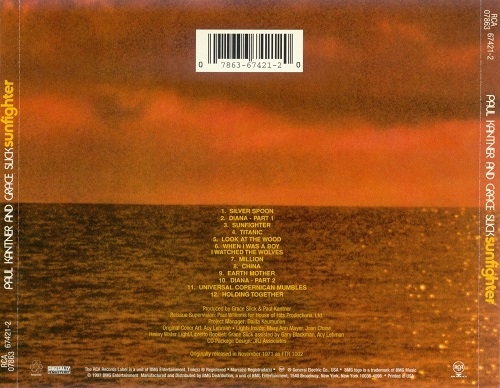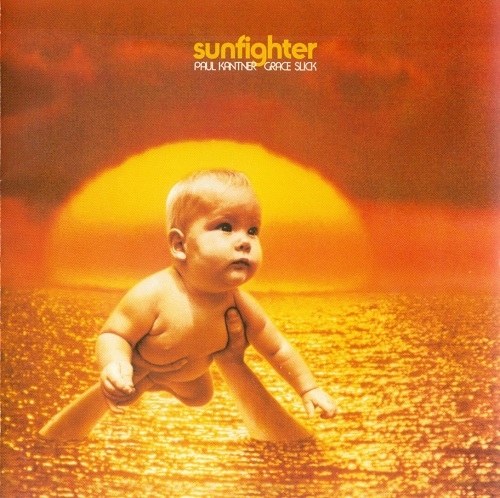
Paul Kantner & Grace Slick - Sunfighter (Reissue) (1971/1997)
BAND/ARTIST: Paul Kantner, Grace Slick
- Title: Sunfighter
- Year Of Release: 1971/1997
- Label: RCA
- Genre: Folk Rock, Psychedelic
- Quality: Mp3 320 / Flac (image, .cue, log)
- Total Time: 42:00
- Total Size: 108/247 Mb (scans)
- WebSite: Album Preview

Tracklist:
01. Silver Spoon
02. Diana Part 1
03. Sunfighter
04. Titanic
05. Look At The Wood
06. When I Was A Boy I Watched The Wolves
07. Million
08. China
09. Earth Mother
10. Diana Part 2
11. Universal Copernican Mumbles
12. Holding Together
Singer/songwriter and rhythm guitarist Paul Kantner was a founding member of Jefferson Airplane and Jefferson Starship. Kantner was the first person approached by singer Marty Balin about putting together a folk-rock group in the mid-'60s in the San Francisco Bay Area. Jefferson Airplane was among the first and the most commercially successful of the San Francisco acid rock psychedelic groups of the '60s. The group began to fragment at the end of the decade, and Kantner released a solo album, Blows Against the Empire, in 1970. It was followed by a duo album with his partner, Airplane lead singer Grace Slick, Sunfighter, in 1971, and a trio album, Baron Vol Tollbooth & the Chrome Nun, with Slick and David Freiberg (who had replaced Balin in the Airplane) in 1973. Kantner and Slick reorganized the Airplane under the name Jefferson Starship in 1974. Kantner released a second solo album, Planet Earth Rock and Roll Orchestra, in 1983, and left Jefferson Starship in 1984, after which the band's name was truncated to Starship. Kantner then launched the KBC Band. In 1989, he was a member of a re-formed version of Jefferson Airplane, and beginning in the '90s, he toured a new edition of Jefferson Starship, which gradually became a Kantner family band by the 21st century. That lineup released an album in 2008 titled Jefferson's Tree of Liberty, also featuring contributions from friends and family including Grace Slick, Marty Balin, David Freiberg, Cathy Richardson, Slick Aguilar, and Prairie Prince. On January 28, 2016, Kantner died of multiple organ failure in San Francisco at the age of 74 (coincidentally on the same day, and at the same age, as original Jefferson Airplane singer Signe Anderson, who predated Grace Slick in the band).
Grace Slick is best known as the powerful-voiced female singer in Jefferson Airplane, Jefferson Starship, and Starship, rock bands with which she performed in the 1960s, '70s, and '80s. She was born to well-to-do parents and grew up in Palo Alto, CA. She became a model and married Jerry Slick. After seeing Jefferson Airplane perform in 1965, she, her husband, and her brother-in-law, Darby Slick, formed the Great Society. The group released a single, "Somebody to Love" (written by Darby Slick) on local North Beach Records in 1966, but broke up soon after. (Columbia Records later culled two albums from the group's live recordings.) Slick was asked to replace Jefferson Airplane singer Signe Anderson and joined the group in time for the recording of its second album, Surrealistic Pillow. She brought with her both "Somebody to Love" and her own composition, the bolero-paced "White Rabbit," with its references to drug-taking and Alice in Wonderland. Both songs were included on the album with her lead vocals. Both became Top Ten hits in 1967, as did the album, and Slick became the focal point of Jefferson Airplane, participating in seven more albums by the group -- After Bathing at Baxter's (1967), Crown of Creation (1968), Bless Its Pointed Little Head (1969), Volunteers (1969), Bark (1971), Long John Silver (1972), and Thirty Seconds Over Winterland (1973). By 1971, with the formation of the group's own custom label, Grunt Records, various bandmembers began to make albums on their own, and Slick combined with guitarist Paul Kantner on Sunfighter (1971). Baron Von Tollbooth & the Chrome Nun (1973) was credited to Kantner, Slick, and David Freiberg. 1974 saw the release of Slick's debut solo album, Manhole. With the departure of Jorma Kaukonen and Jack Casady, Jefferson Airplane had ceased to exist after 1972. Kantner and Slick reorganized the band under the name Jefferson Starship and released Dragon Fly in 1974. In 1975 came Red Octopus, which topped the charts and sold two million copies. Spitfire (1976) was also a million-seller, as was Earth (1978). Slick left the group and released two solo albums, Dreams (1980) and Welcome to the Wrecking Ball! (1981), then rejoined as a guest on Modern Times (1981) and participated fully on Winds of Change (1982) and Nuclear Furniture (1984). She also recorded a fourth solo album, Software (1984). Kantner's departure from the group led to a truncation of its name to Starship. Slick remained through the million-selling Knee Deep in the Hoopla (1985) and No Protection (1987), sharing lead vocals with Mickey Thomas on the number one hits "We Built This City" and "Nothing's Gonna Stop Us Now." She left the group in 1988. In 1989 she joined a reunion of Jefferson Airplane that resulted in a tour and a self-titled album. She retired from performing in the 1990s and wrote her autobiography, Somebody to Love?, published in 1998. In 1999 RCA released The Best of Grace Slick, a career-spanning compilation album.
Grace Slick is best known as the powerful-voiced female singer in Jefferson Airplane, Jefferson Starship, and Starship, rock bands with which she performed in the 1960s, '70s, and '80s. She was born to well-to-do parents and grew up in Palo Alto, CA. She became a model and married Jerry Slick. After seeing Jefferson Airplane perform in 1965, she, her husband, and her brother-in-law, Darby Slick, formed the Great Society. The group released a single, "Somebody to Love" (written by Darby Slick) on local North Beach Records in 1966, but broke up soon after. (Columbia Records later culled two albums from the group's live recordings.) Slick was asked to replace Jefferson Airplane singer Signe Anderson and joined the group in time for the recording of its second album, Surrealistic Pillow. She brought with her both "Somebody to Love" and her own composition, the bolero-paced "White Rabbit," with its references to drug-taking and Alice in Wonderland. Both songs were included on the album with her lead vocals. Both became Top Ten hits in 1967, as did the album, and Slick became the focal point of Jefferson Airplane, participating in seven more albums by the group -- After Bathing at Baxter's (1967), Crown of Creation (1968), Bless Its Pointed Little Head (1969), Volunteers (1969), Bark (1971), Long John Silver (1972), and Thirty Seconds Over Winterland (1973). By 1971, with the formation of the group's own custom label, Grunt Records, various bandmembers began to make albums on their own, and Slick combined with guitarist Paul Kantner on Sunfighter (1971). Baron Von Tollbooth & the Chrome Nun (1973) was credited to Kantner, Slick, and David Freiberg. 1974 saw the release of Slick's debut solo album, Manhole. With the departure of Jorma Kaukonen and Jack Casady, Jefferson Airplane had ceased to exist after 1972. Kantner and Slick reorganized the band under the name Jefferson Starship and released Dragon Fly in 1974. In 1975 came Red Octopus, which topped the charts and sold two million copies. Spitfire (1976) was also a million-seller, as was Earth (1978). Slick left the group and released two solo albums, Dreams (1980) and Welcome to the Wrecking Ball! (1981), then rejoined as a guest on Modern Times (1981) and participated fully on Winds of Change (1982) and Nuclear Furniture (1984). She also recorded a fourth solo album, Software (1984). Kantner's departure from the group led to a truncation of its name to Starship. Slick remained through the million-selling Knee Deep in the Hoopla (1985) and No Protection (1987), sharing lead vocals with Mickey Thomas on the number one hits "We Built This City" and "Nothing's Gonna Stop Us Now." She left the group in 1988. In 1989 she joined a reunion of Jefferson Airplane that resulted in a tour and a self-titled album. She retired from performing in the 1990s and wrote her autobiography, Somebody to Love?, published in 1998. In 1999 RCA released The Best of Grace Slick, a career-spanning compilation album.
Oldies | Rock | FLAC / APE | Mp3
As a ISRA.CLOUD's PREMIUM member you will have the following benefits:
- Unlimited high speed downloads
- Download directly without waiting time
- Unlimited parallel downloads
- Support for download accelerators
- No advertising
- Resume broken downloads


